|
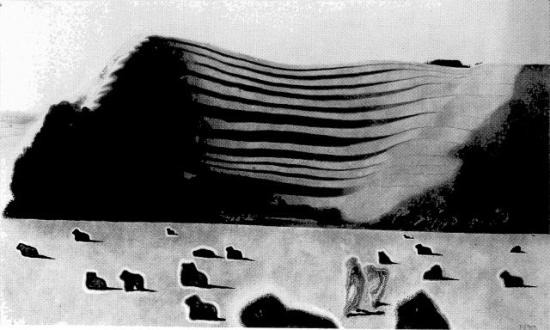
Under The Hill
1964-5
Edward Burra
b. March 29, 1905
_______________________
The Political Unconscious of the Anthropocene:
A conversation with Frederic Neyrat by Elizabeth R. Johnson
society and space
(....) Frederic Neyrat
Today, the theoretical field must resist two dangers. The first one is human exceptionalism, that is to say the split between humans inhabiting the fantasy of their absolute immunity and the rest of the world, animals considered as meat for slaughterhouses, as existentially worthless (worthless does not mean, of course, without a price: Nietzsche understood one century ago that to have a price means to be worthless). To be anthropocentric and to constitute the fiction of human exceptionalism first requires the creation of an ontological domain in which humans are withdrawn from the world. A relational thought is necessary to fight this danger. From its beginnings, environmental thought has contested human exceptionalism, this dangerous transcendence that enabled Descartes to argue that we can become “masters and possessors of nature”. And thanks to the concept of immanence – say, from Spinoza to Deleuze – it was possible to contest the fictions of transcendence. Yet it is here that the other danger appears, that of absolute immanence, that of the Spinozist immanence where – as the etymology tells us (im-manere) – everything always stays inside. In other words, the other danger is relational excess, the belief that everything is interconnected, hyper-connected: that’s the symmetrical fantasy of the immune fantasy! In the passage you quote, I wanted to show that immanence is not one, but multiple, in other words, infinitely open, torn apart, crossed by an infinity of outsides. Here is the crucial point, and honestly it took time before I got it: it’s not separation that we must fight, but splits. A split juxtaposes two realities without mediation, whereas a separation is that without which a relation becomes a fusion, and fusion is not a relation, fusion is the suppression of separation in absolute immanence. Environmental thought must stop believing that it must fight separations: splits are its enemy!
...(more)
_______________________
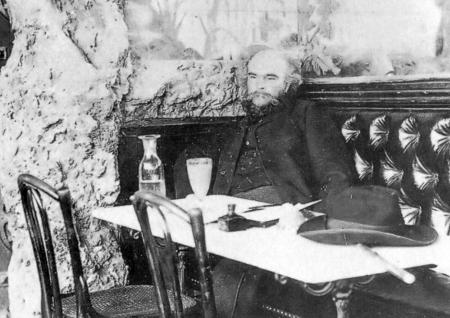
Paul Verlaine
b. March 30, 1844
photo by M. Dornac
c. 1892
Melancholy
Paul Verlaine
translated by Gertrude Hall
I am the Empire in the last of its decline,
That sees the tall, fair-haired Barbarians pass,-the while
Composing indolent acrostics, in a style
Of gold, with languid sunshine dancing in each line.
The solitary soul is heart-sick with a vile
Ennui. Down yon, they say, War's torches bloody shine.
Alas, to be so faint of will, one must resign
The chance of brave adventure in the splendid file,-
Of death, perchance! Alas, so lagging in desire!
Ah, all is drunk! Bathyllus, has done laughing, pray?
Ah, all is drunk,-all eaten! Nothing more to say!
Alone, a vapid verse one tosses in the fire;
Alone, a somewhat thievish slave neglecting one;
Alone, a vague disgust of all beneath the sun!
Poems Of Paul Verlaine
Translated by Gertrude Hall
Seventy-Three Poems
Translated by A. S. Kline
_______________________

Café
Edward Burra
c.1928-29
_______________________
Avant-Garde in a Different Key:
Karl Kraus’s The Last Days of Mankind
Marjorie Perloff
critical inquiry
(....)
Discussions of the early twentieth-century avant-garde rarely refer to the writings of Kraus or Wittgenstein, of Joseph Roth and Elias Canetti, and, in the next generation, of Paul Celan or Ingeborg Bachmann. In part, this neglect has to do with the subordinate status of post-World War I Austria, whose literature has been treated, at least in the English-speaking world, as if it were merely part of the larger body of “German” writing. In this context, the emphasis on the Marxist literature of the Weimar Republic, from Bertolt Brecht to the great critical theorists Walter Benjamin and Theodor W. Adorno, has eclipsed its very different Austrian counterpart.
It is also the case that Austrian writers like Kraus, Canetti, or, for that matter, Franz Kafka were not, strictly speaking, formal innovators. True, The Last Days of Mankind can be called a collage text. But, unlike the zaum (beyond-sense) poetry of the Russian avant-garde, unlike the parole in libertà and “destruction of syntax” of Italian futurism, or the fragmentation, hyperbolic “non-sense,” and elaborate verbal play of dada, both in its French and German incarnations,[5] the Austro-modernists in question opted for the seeming transparency of coherent sentences and “normal” paragraphs. They neither wrote manifestos like F. T. Marinetti or Tristan Tzara nor announced that they were making it new (Ezra Pound), nor did they produce readymades (Marcel Duchamp) or abstract verbal portraits that avoided nouns and adjectives in favor of articles and function words (Gertrude Stein). Indeed, in the case of poetry, lyric continued to prevail. However complex their language, Celan’s minimalist poems, for example, adhere to lyric norms and rely on lineation and even stanzaic structure.
But suppose we go back to the original meaning of avant-garde. In its inception in the sixteenth century, the term referred to the front flank of the army, the forerunners, those ahead of their time whose work cannot yet be understood. In this sense, the Austrian modernists can now be seen to have produced a poetics of rupture perhaps as profound as that of their more formally radical counterparts in Italy, France, or Russia. Theirs was a world that Karl Kraus called the unimaginable—a world of a war whose purpose was never really defined and yet literally shattered their lives. Rupture, for the citizens of the Dual Monarchy was much more extreme than for Germany, which did not, after all, forfeit its basic identity; its geographic and ethnic pre-war contours, like those of France and Great Britain, remained essentially intact.
...(more)
_______________________
Who Is Urizen, anyway
Jim Culleny
3quarksdaily
In William’s crisp mandala Blake_god_creating
Urizen asymmetrically stoops
Laying dualism on the world,
cleaving philosophers’ minds,
inspiring theologians to settle scores,
he undoes the unity of chaos
splitting it to bits like logs
to fuel the fires of wars
...(more)
_______________________

The Allotments
Edward Burra
1962-3
_______________________
Group Therapy
Jack Dean
occupied times
In The Hitchhiker’s Guide to the Galaxy, ‘Wonko the Sane’, a marine biologist from California, finds himself confronted with a pack of toothpicks with printed instructions on them. Wonko is moved to redraw the boundary of the asylum to encompass the whole world – except his home, which he turns inside out and classifies as the only place outside the asylum. “It seemed to him,” wrote Douglas Adams, “that any civilisation that had so far lost its head as to need to include a set of detailed instructions for use in a package of toothpicks was no longer a civilisation in which he could live and stay sane.” He resolves to never enter the asylum again.
Every day millions of us shuffle to meaningless jobs, or are commanded to search for them, in a collective act analogous to mass occupational therapy: thousands of Nurse Ratchets, in council offices, MP surgeries and Job Centres, massage our behaviour, preventing us from ever locating the mechanisms at the root of our suffering. Parallel to our being managed, we witness the expression of collective madness that is the joyless hedonism of Leicester Square on a Saturday night. Beneath a tissue-thin layer, we conceal an existential dread that for far too many erupts into a disruptive and harmful breakdown.
The asylum is here, and we all live in it.
...(more)

Albert Pinkham Ryder
d. March 28, 1917
_______________________
Ars Poetica
Juan Gelman
translated by Joan Lindgren
like a hammer reality/hammers away
at the membranes of the soul or the heart/forges on
in heat or in cold / presumes nothing/dries out
the rotten illusions/thinks
like a hoarse-voiced bird/raves
in its dreams/roars the roar
of Pascual’s tiger/stomps on
the little membranes of the soul or the heart/sizzled
in your heat tomorrow/will sound
like a shot in the forehead of the compañero who died yesterday
and in what has yet to die and be born/
like a hammer
Juan Gelman or “about a truth that didn’t believe in death” by Víctor Rodríguez Núñez & Katherine M. Hedeen
(....)
Juan Gelman is the most read, most influential Spanish-language poet of our times. With 30 books published, he is the winner of the Cervantes Prize (2007), the top literary honor in Spanish-language literature. He worked as a journalist and translator, spent many years exiled in Europe and Latin America, and remained an ardent critic of Argentina’s military dictatorship throughout his life. He was above all faithful to poetry as a transformative act — as the quest for a more humane society, and a way to broaden our understanding of the world through universal dialogue. The Argentine novelist Julio Cortázar said that Gelman’s work must be read “by remaining open, allowing meaning to enter other doorways than those of syntactical structure,” for “only in this way can the reader discover the reality of the poems, which is none other than the exact and literal reality of the horror and death, but also the hope, that define Argentina.” (Gelman, Unthinkable 4). His death marks not just the end of an era in poetry written in Spanish, but also the passing of a man who never forgot he was part of a family of Jewish immigrants from the Ukraine — an Argentine underdog until the very end.
...(more)
via Pierre Joris

Juan Gelman
1930 - 2014
_______________________
Free Will. Thirty Points of View
Methode Vol 2, No 3 (2013)
Introduction
Sofia Bonicalzi and Mario De Caro
(....)A different reason for thinking that the long discussions on free will have gen-
erated no real progress could be based on the idea that the solution of this problem
is obvious. Indeed, if – in line with Descartes, Samuel Johnson, and Sartre – one
believes that obviously we have free will, then it may look like there is not much
to discuss about it. Conversely, if one thinks that obviously we do not have free
will, then instead of reflecting on something that does not exist one could prefer to
play chess or eat pizzas (unfreely, of course).
Perhaps these views have some legitimacy. Today, however, most philosophers
would rather claim that – even if the free will issue is undoubtedly very complex
and we might not ever be able to solve it – there is no doubt that, especially in
the last three or four decades, a great progress has been made in understanding it.
In fact, some old views have been sharpened, others have been refuted, and new
ones have been advanced. More importantly, great technical advancements have
been made in understanding the concepts involved in the questions, and many new
interesting arguments have been developed. That said, it should also be noticed
that in recent years the debate on free will has grown so much, and in so many
different directions, that it is difficult to understand what the state of the art is. For
this reason, we have thought that it could be interesting to collect the opinions of
the leading experts about some of the most crucial questions concerning free will
and its cognate notion of moral responsibility....(more)
Methode - Analytic Perspectives
_______________________
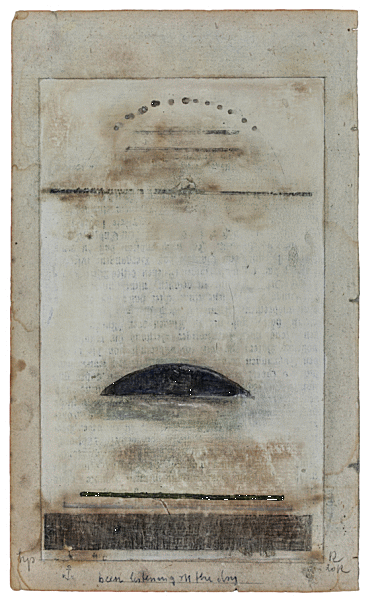
"been listening all the day"
Herbert Pfostl
Light Issued Against Ruin
50 Watts
_______________________
The Cambridge Journal of Postcolonial Literary Inquiry
Volume 1 - Special Issue 01 (Special Issue: New Topographies of the Postcolonial) - March 2014
Editorial: New Topographies
Ato Quayson, Debjani Ganguly and Neil ten Kortenaar
(....)
It remains for us now to attend briefly to the contemporary conjunctures of postcolonial criticism on which this inaugural issue is based. In signaling these through the idea of topography, we once again, Bakhtin-like, conjoin literary space-making with the materiality of the temporal. At a time when disciplines are scrambling to keep up with both the accelerations and upheavals of a global informational economy and radical geopolitical shifts away from Euro-American dominance, how, we ask, might literary postcolonialism be reconfigured? Since the turn of the century we have witnessed genuine shifts in world literary flows brought on by proliferating information technology and translation networks; by transformed territorial and economic alignments in a post-Soviet era; and by the emergence of multiple war zones and new ethnic and religious conflagrations. Large-scale humanitarian crises wrought by wars and catastrophic climate change have brought new subalterns into our moral economy—asylum seekers, climate refugees, illegal migrants, and even large swathes of the Muslim populace demonized as a consequence of the ghoulish global visibility of fundamentalist versions of political Islam.
Critical responses to these developments on the part of our contributors are the beginnings of a long conversation that will play out in the pages of this journal in the years to come. For now, they showcase emergent literary topographies that can no longer be circumscribed by the classic postcolonial geographies of Europe and its others. ...(more)

Paula Rego
The Curved Planks, Dear Paula, and a note on Paula Rego
Yves Bonnefoy.
Translated by Anthony Rudolf
Etchings by Paula Rego
fortnightly review
Dear Paula,
…the dark but tranquil waters of this lake or river – nothing but the sound of gentle splashing among the rushes by the shore, beneath the first stars – where the ferryman of my fable is waiting, begin to tremble, and soon there are waves, and behind these great waves, in the darkness of night already fallen, amid the din of what sounds like a landslide, I hear howling, barking, strange laughs, cries: so many people standing in their boats: young and old, men and women, ageless children, tormentors and victims, soon they will all parade before the little boy who is speaking shyly, sadly, to an unknown man whom he is gazing at imploringly and whom he fears but who, he senses, wishes him well. The hubbub grows louder, the shadows are already lengthening on the water, the first boats appear – and then, all of a sudden, the other world is there, our eyes have closed, we are sleeping, the most tangled and elusive part of our nocturnal dream possesses everything. Paula, you put speech to the test of night. The frail voice which sought the clearest and simplest truth in the relationship between people, you bury it, as a mountain crumbles, under the multiplying voices that you hear crashing around inside you, as they protest violently, crazily, angrily, in the abyss of the unconscious. Your dark revelations have become the entire sky, the entire earth. What will remain of the hope of this child who has arrived from nowhere, clutching in his clenched fist what he needs to pay for his passage?
...(more)
_______________________
Try to forget.
Lauren Berlant
Not unintentional forgetting, but of a thing that insists on being in the flow of things.
(....)
***
It’s all the rage to have impatience with ambivalence, but personality is our style of getting in the way of our own aims. Sometimes I wonder, Why do I bother talking, and then I laugh: life’s a racket. The mother’s, the teacher’s, the lover’s complaint is the content of everyone’s dread. Talking converts pillar into hydrant, word into police, touch into plots, person into a plastic clown statue that rocks and rights. I said some things to them: and then I saw that I was not just about to lose a lot of world, but had already lost it.
***
Sitting with the loss of the world requires a supple affective infrastructure, or a religion, which I reject, as I prefer not to be triangulated. If you’re a kind of thing whose lack of fit is endemic, if you sense that the bad life is impersonal and political while also overclose, it structures living as organically as anything about you, such as having had the trunk of your own body your whole life, stretching, bloating, twisting, holding you up, taking blows, manufacturing joys in the cracks, and being outlined by fabric that discloses so little that nakedness is always jolting.
...(more)
berfrois
Lauren Berlant posts at Supervalent Thought_______________________
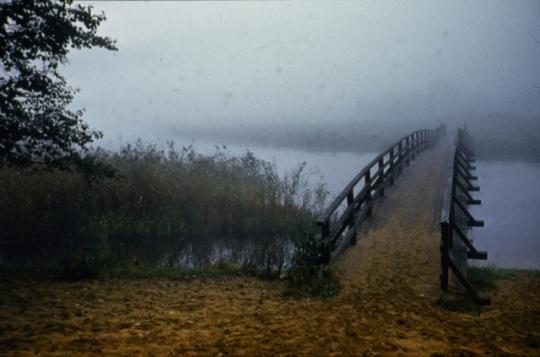
A Remote Barely Audible Evening Waltz
Max Sher
_______________________
Introducing “Nature on the Move” – A Triptych
Sian Sullivan, Jim Igoe, Bram Buscher
In the spirit of New Proposals – a journal of interdisciplinary enquiry “dedicated to the radical transformation of the contemporary world order” – we are pleased to offer the following three papers. They are the outcome of a three-year process of conversation and engagement, characterised by both disagreement and excitement. Our shared concern has been how best to theorise and understand the socio-economic displacements we have each observed through studying and engaging with conservation policy and practice in varied contexts since the 1990s. We have witnessed landscapes, natures and peoples of the global south become increasingly entwined with market-oriented solutions to ecological and eco- nomic imperatives of improvement, with outcomes that can intensify inequitable patterns of fortune and misfortune in both social and environmental registers. We have documented the occlusion of local and indigenous knowledges and concerns, alongside the amplification of specific wildlife populations and consumptive access to these by foreign tourists. We have noted that conservation successes, such as increased incomes from ecotourism and strengthened numbers of “big game,” frequently are accompanied by a paradoxical entrenching of detrimental environmental impacts globally through emissions-related climate change and amplified material consumption generally. And we have wryly observed the myriad displacements effected in a growing zeitgeist claiming that such effects can be “offset” by paying for conservation investments somewhere else. As environmental activists remind us, on a single planet limited by the borders of space, there is no “elsewhere;” there is no “away.” With others, we have experienced attempts to silence and close down interventions that state concern at some of the socioecological displacements and injustices we have observed. Whilst celebrating the resilience and diversity of struggles globally, we seethese closures as connected with broader hegemonic dynamics that seek to create (or at least appear to cre- ate) a consenting “civil society” by reducing resistance possibilities and the expression and practice of radical alternatives.
New Proposals: Journal of Marxism and Interdisciplinary Inquiry
_______________________

Khorog, July 12, 2010
37°28'28.08?N, 71°35'34.82?E
Russian Palimpsest
Max Sher
The new objectivity:
photographer Max Sher’s alternative guide to Russia
Text and image: Max Sher
The Calvert Journal
(....)
Russia is still at a loss for a dispassionate visual representation of its territory. During the Soviet period, official photography produced feel-good images that obscured reality. In contrast, the unofficial, “democratic” photography that emerged during the last two decades of the Soviet Union focused on portraying the darkest sides of reality in a bid to lift the lid on the so-called truth. In both cases, few were interested in recording the landscape with a detached, scientific eye.
My aim is to rectify both biases in order to aestheticise that which is considered “ugly” in the Russian landscape (thanks in part to those democratic image-makers) and help it enter our consciousness. It’s nothing new if we think of what the pre-1917 Russian photographers looked at and photographed. Before the Russian Revolution, postcards featured photographs of prisons and poor neighbourhoods. Yet they were photographed in an "objective" manner.
The point is that this is what Russia looks like so we should learn to accept it, prisoners and all, and reclaim these images as our own. I want to inspire a shift from the sublime and the dramatic to the everyday — the petrol stations, bridges, warehouses, railway crossings, shopping malls and yes, the prisons. I want to explore, record and accept all this in its entirety and so, I have adopted the deadpan aesthetic conceptualised in the 1950s by a group of German and American photographers who would later come to be known collectively as the New Topographics and the Düsseldorf School of Photography.
...(more)
The Calvert JournalA guide to creative Russia
via languagehat
_______________________
Humanity
Gregory Corso
b. March 26, 1930
What simple profundities
What profound simplicities
To sit down among the trees
and breathe with them
in murmur brool and breeze —
And how can I trust them
who pollute the sky
with heavens
the below with hells
Well, humankind,
I’m part of you
and so my son
but neither of us
will believe
your big sad lie
_______________________
In the Name of Love
Miya Tokumitsu
(....)
There’s little doubt that “do what you love” (DWYL) is now the unofficial work mantra for our time. The problem is that it leads not to salvation, but to the devaluation of actual work, including the very work it pretends to elevate?— and more importantly, the dehumanization of the vast majority of laborers.
Superficially, DWYL is an uplifting piece of advice, urging us to ponder what it is we most enjoy doing and then turn that activity into a wage-generating enterprise. But why should our pleasure be for profit? Who is the audience for this dictum? Who is not?
By keeping us focused on ourselves and our individual happiness, DWYL distracts us from the working conditions of others while validating our own choices and relieving us from obligations to all who labor, whether or not they love it. It is the secret handshake of the privileged and a worldview that disguises its elitism as noble self-betterment. According to this way of thinking, labor is not something one does for compensation, but an act of self-love. If profit doesn’t happen to follow, it is because the worker’s passion and determination were insufficient. Its real achievement is making workers believe their labor serves the self and not the marketplace.
...(more)
Jacobin
_______________________

Map And Territory
Max Sher
_______________________
Elegiac Feelings American
Gregory Corso
(....)
Alas, Jack, seems I cannot requiem thee without
requieming America, and that's one requiem
I shall not presume, for as long as I live there'll
be no requiems for me
For though the tree dies the tree is born anew, only until
the tree dies forever and never a tree born
anew. . . shall the ground die too
Yours the eyes that saw, the heart that felt, the voice that
sang and cried; and as long as America shall live, though
ye old Kerouac body hath died, yet shall you live. . .
for indeed ours was a time of prophecy without death
as a consequence. . . for indeed after us came the time
of assassins, and whotll doubt thy last words 'After
me. . . the deluge'
Ah, but were it a matter of seasons I'd not doubt the return of the
tree, for what good the ground upon which we stand
itself unable to stand—aye the tree will in seasonal
time fall, for it be nature's wont, thaPs why the
ground, the down, the slow yet sure decomposition,
until the very tree becomes the very ground where
once it stood; yet falls the ground. . . ah, then what?
unanswerable this be unto nature, for there is no
ground whereon to fall and land, no down, no up
even, directionless, and into what, if what,
composition goeth its decomposition?
We came to announce the human spirit in the name of
beauty and truth; and now this spirit cries out in nature's sake
the horrendous imbalance of all things natural. . .
elusive nature caught! like a bird in hand, harnessed
and engineered in the unevolutional ways of
experiment and technique
Yes though the tree has taken root in the ground the ground is
upturned and in this forced vomitage is spewn the
dire miasma of fossilific trees of death the
million-yeared pitch and grease of a dinosauric age
dead and gone how all brought to surface again and
made to roam the sky we breathe in stampedes of
pollution
...(more)

Der Zeichner vor Dresden
1930
Conrad Felixmüller
d. March 24, 1977
_______________________
on the University as anxiety machine
Richard Hall
We think we know what the narrative is. But over time it fractures and cracks and dies and is reborn. As we fracture and crack and die and are reborn.
Inside this world, inside our history, inside this capitalism we fracture and crack under the stress of it all. The toxic stress of being for economic growth. Of being for an entrepreneurial life. Of giving away our labour. Of alienating our labour. Of giving away ourselves. Of alienating ourselves. We willingly give it up. This is the new normal. We willingly give up our very selves so that they can accumulate value. We accede to their dominance so that we can survive and breathe and have hope. Hope in the face of the reality that our fracture and our cracking are driven by their hegemony and their economic growth.
The power of their narrative of economic growth, which subsumes our labour, and that is visited upon the University. Their common sense. Their intellectual rigour. The new normal.
(....)
This is the dissolution of the University as a means for the domination/hegemony of a particular world view or a specific class. This is the dissolution of the University as a coercive space that is re-forged inside-and-against student-debt and impact and research excellence and analytics and employability and entrepreneurship. This is the dissolution of the University as the civil society of tenured professors versus casualised precariat. This is the dissolution of the consensus that reshapes the civil society of higher education in the interests of capital through the ideology of student-as-consumer. This is the dissolution of a higher education that is for materialism and value.
...(more)
via Forgottenness _______________________
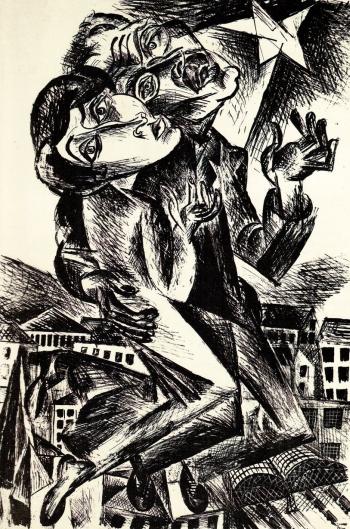
People above the world
Conrad Felixmüller
1919
_______________________
Corporatizing activism
Peter Dauvergne, Genevieve LeBaron
eurozine
(....)
Advocacy for far-reaching change in world politics is increasingly off the table: radically-reorienting international organizations, redistributing global income, reining in multinational corporations beyond voluntary codes of conduct, reversing unfair terms-of-trade, protecting workers and pushing for a different economic order that is based around sharing and an end to growth.
(....)
Narrow thinking, bureaucratic structures and the overriding priority of fundraising lead NGOs to treat people as donors and consumers, rather than to empower them to struggle for social justice. The pursuit of money, as Michael Edwards writes in the openDemocracy focus "Transformation", can "turn helping others into another form of domination"
Corporatization has major consequences, not only for NGO-style activism but also for protest movements, and even for dissent more broadly. The belief that voluntary action by business can decrease inequality, advance human rights and slow environmental destruction is strengthening. And by legitimatizing corporate power in world politics, these emerging trends are marginalizing campaigns for system-wide change. The corporatization of activism is occurring against a backdrop of incentives and pressures to conform with the existing global order, including a worldwide security crackdown on direct action, protest and dissent; far-reaching changes in the nature of social life, including the strengthening of consumerism; and the growing power of corporations to set their own rules. ...(more)
_______________________

Newspaper Boy
Conrad Felixmüller
1928
_______________________
Questionnaire
Wendell Berry
How much poison are you willing
to eat for the success of the free
market and global trade? Please
name your preferred poisons.
For the sake of goodness, how much
evil are you willing to do?
Fill in the following blanks
with the names of your favorite
evils and acts of hatred.
What sacrifices are you prepared
to make for culture and civilization?
Please list the monuments, shrines,
and works of art you would
most willingly destroy
In the name of patriotism and
the flag, how much of our beloved
land are you willing to desecrate?
List in the following spaces
the mountains, rivers, towns, farms
you could most readily do without.
State briefly the ideas, ideals, or hopes,
the energy sources, the kinds of security;
for which you would kill a child.
Name, please, the children whom
you would be willing to kill.
thanks to —synthetic_zero
_______________________

Fischer von Helgoland
Conrad Felixmüller
1924.
_______________________
The Apparatus of Ideology:
A Post-Colonial Reading of English Literature; Considerations from 'Institutional Literatures'
M. Abu-Shomar Ayman
Abstract:
This paper reviews the concept and the corpus of English literature and its development in the context of culture and the academy from the 18th Century onwards. I argue that the category of literature is a ‘liquid’ notion best understood as a form of ‘social action’ (after Eagleton) relevant to wider social, cultural, and political contexts that produce and ‘consume’ it. In the academy, through extending the notion of the institution to a wider social and political context, literature could be best understood as an ‘institutional reality’ reflecting perceived relations of power. Deeming literature as an ideological tribute is crucially important to arguing against the monolithic and essentialist (Anglo-American literary tradition) as embodying a universal value that still prevail in post-colonial institutions. This argument helps conceptualise and interrogate the cultural constructs embodied in English literature, in general, and the English canonical texts, in particular; it also makes it possible to refute the claim that literature transcends its local boundaries and nationalist sentiments to articulate the universal concerns and values of all people. In my approach to these claims and assumptions, I resort to a critical narrative review to the 'story' of the English literature in cultural, political, social, geographical and institutional contexts.. In academy, particularly in post-colonial settings, I conclude that the adopted literary tradition reflects a matrix of relations of power and institutional affiliations. Such conceptualisation of literature helps to challenge the claim that English literature largely embodies a humanistic enterprise of universal values and uniform human experience.
Social Science Research Network
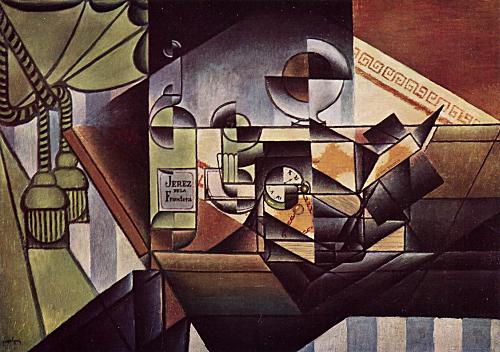
The Watch (The Sherry Bottle)
1912
Juan Gris
b. March 23, 1887
_______________________
Fred Phelps, The Marcel Duchamp of Hate
Carl Wilson
hazlitt
(....)
I think there’s a clue there to why we’re so drawn to tales of perfidious and perverse padres. First, against all our better reason, there is a creeping fear that the Bible thumpers might be right and we’re headed to the fiery pits. More insidiously, though, there’s the chilliness of the more level-headed worldview that there is no ultimate reward for all our suffering other than the passing joys of mutual affection and getting a few decades to touch willow trees, read Patricia Highsmith novels, and listen to the Wu-Tang Clan.
In the WBC’s temple of Dada, everything is God’s punishment for homosexuality.
Which is pretty fucking good, really. But in our more ungrateful moments, we resent knowing there are far more comforting stories available from every eternal-life-promising, social-hierarchy-justifying religion on the planet—beliefs most of us accepted in some interlude of our lives, but found untenable. And this psychology applies not only to heathens, I suspect, but to adults of good faith, for whom the ratios of devotion to doubt might be reversed but still settle leagues from any longed-for state of certainty.
Either way, we want to lash back against our attraction/submission to the pushers of solace. So we flip the polarities on their own Manichean dynamics and make these shepherds out to be lamb-slaughtering wolves. There’s plenty of supporting evidence: never mind the Inquisition, here’s the residential-school system. But a lot of the artistic renditions veer quickly away from the horrible-enough banality of evil to the cartoon-supervillain, secret-Satanist, holy con man.
Thus the brilliance of Fred Phelps, metafictional conceptual artist, who finally made flesh of these fantasies, and through his theatre of the absurd rendered all others redundant. ...(more)
_______________________

Estelle Zolotoff
via ici et maintenant
_______________________
Sina Queyras, M x T
review by rob mclennan
(....)
At times, Queyras writes of writing instead of feeling, wishing for a language less aware of theory and far more visceral, as in the opening poem, “Water, Water Everywhere”:
I am not interested in what Bourdieu, or Kristeva, has to say about grief. I don’t want a grid, I want arms. I don’t want a theory; I want the poem inside me I want the poem to unfurl like a thousand monks chanting inside me. I want the poem to skewer me, to catapult me into the clouds I want to sink into the rhythm of your weeping, I want to say, My grief is turning and I have no way to remain still.
The irony is that her poems are rife with references to writing, writers and theory (some of which feel self-consciously included), included as touchstones to articulate those feelings, and managing to uncover some remarkable insights, such as the curiously-sly “All mature poets understand the need for dry wood chips.” from the poem “A Manual for Remembering.” Another: “If you can’t feel love in life you won’t feel it in death,” she writes, to open the poem “Sylvia Plath’s Elegy for Sylvia Plath,” allowing Plath a post-mortem clarity that might have saved her. M x T is a striking collection, pushing fiercely through the complicated mess of memory and grief, and fully aware that if one goes deep enough, grief might just not let go. Later in the poem “A Manual for Remembering,” she writes:
Don’t paint yourself into a corner. Ask yourself, What would Diane Arbus do?
rob mclennan
MxTSina Queyras
_______________________
Response: Terrestrial Melancholy and the Infinite Sadness
Ben Woodard
author of On an Ungrounded Earth: Towards a New Geophilosophy
(....)
I would argue that the greatest barriers to ecological intervention are those surrounding the aesthetics of nature, which are tied to a history of exploitative and mythical fictionalizations of the Earth. It is in this regard that On an Ungrounded Earth attempted, whether successfully or not, to create an anti-aesthetics. My own fascination with horror and its relation to the inhuman is an aesthetic choice made to highlight the epistemological and aesthetic gap that exists between the ontological and the political. It is this jump that I would point to in response to Bosworth’s question about my own fascinations and how they relate to my critique of Jane Bennett’s use of affect in her quite interesting text Vibrant Matter: A Political Ontology of Things.
(....)
Harlan Morehouse suggests that, like Emil Cioran, I may be guilty of being ‘intoxicated by the void’. Again, I would appeal to the aesthetic dimension of my work. I would gladly call Cioran, borrowing Thomas Ligotti’s phrase, a ‘sympathetic organism’, and point out his own enjoyment for what he is doing. It is not simply that he illustrates the void to which we seem on track to meet, but that there is something to be said for describing things in such a way. In The Trouble with Being Born Cioran quips that the problem with suicide is that it always happens already too late. A similar statement can be made with regard to ecology – the problem with intentional human extinction for the sake of the earth is that it is already too late. Only an optimist would consider such mass suicide: there is too much of a mess.
(....)
The crux of the matter, I believe, is how to avoid the Charybdis of philosophy being that which helps us feel like we are being political or make us and our lives meaningful as well as the Scylla of critique which leaves us in a state of inaction. That is, there is an assumption that political action requires heaping meaning upon ourselves and yet such meaning can easily bury political actions in self-aggrandizement. What may very well be viewed as a cold-hearted pragmatic view is the only one that I see as being politically viable in terms of maintaining the best and broadest capacity for life on the planet. This pragmatism in a seemingly contradictory but necessary fashion is what guides our best attempts to fuel large-scale geoengineering proejects.
...(more)
_______________________
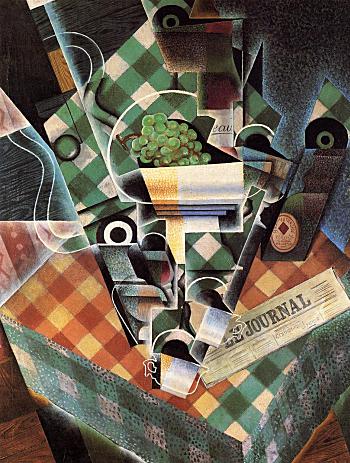
Still Life with Checked Tablecloth
Juan Gris
1915
_______________________
The Internet as Politicizing Instrument
Transformations Issue No. 23 2013
This issue of Transformations presents essays responding to Marcus Breen’s recent book Uprising: The Internet’s Unintended Consequences. Breen asks whether the Internet can become a politicising instrument for the new online proletariat – the individualised users isolated by the monitor screen. He asks “if the proletariat can use the Internet, is it freed from the moral and social constraints of the past that were imposed by conventional media and its regulation of the public space?” This question raises further issues. Does this freedom translate into an emancipatory politics where the proletariat is able to pursue its own ends, or does it simply reproduce the power relation between the user-subject and the Internet and those who control and manage it. The articles in this issue respond in various ways to these questions.
The Internet and Privatism: Reconstructing the Monitor Space
Marcus Breen
It is difficult to engage in self-criticism about Internet use because personal incorporation into the virtual world can involve challenges to established myths, such as the value of contemporary communication technologies for economic, personal and economic development (McChesney). And yet it is possible to see the world and its excesses in the monitor in such a way that the autoethnographic readings of and by Internet users advance Ellis’s and Bochner’s suggestions of the need for research that recognises the intensified “reflexive and dialogic texts,” “personal experiential narratives,” “narratives of the self,” and co-constructed and performativity narratives that inevitably open up keen reflections on the private lives of users. For example, the always-on experience of everyday life in the advanced north allows for total immersion in Internet culture and a remaking of the nature of being and becoming. This ontology is defined by the privatised space of the monitor, where the private self seeks the prospect and the realisation of emancipation. Where human existence is revealed in pixilated, individuated detail like never before, it always already offers private revelations. Criticism of the Internet’s revealed “self” must acknowledge the complicated reflections of personhood within the dominant culture of individual self-realisation as well as virtual communities. Indeed, one of the successes of neo-liberalism is the notion that the only way forward within global capitalism is the energized mobilization of privatism within the American imperial imagination. Against this, the increasing filtered singularity of the Internet narrative has been a part of the dystopian argument proposed by Jaron Lanier and others. The Internet embodies and naturalises this ideology through the everyday structure of individual being. The following discussion visits the Internet’s naturalisation of the concept of privatism, exploring how it generates new knowledge of the self.
...(more)
The Digital Hysterias of Decentralisation, Entrepreneurship and Open Community
Fidele Vlavo
From Ideology to Algorithm: the Opaque Politics of the Internet
Emit Snake-Beings
_______________________
The Internet Is Not A River: Space, Movement & Personhood In A Wired World
Samuel Veissière
_______________________
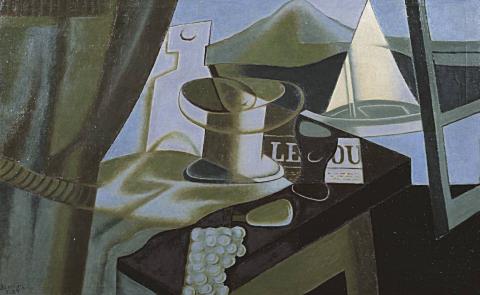
Overlooking the Bay
Juan Gris
1921
_______________________
The Miracle of Analogy
Kaja Silverman
(....)
... although there have been pitched battles between those who champion the evidentiary value of the photographic image, and those who emphasize its constructedness, the former is only another way of overcoming doubt. If a photograph can prove “what was,” then it is the royal road to certainty—the means through which we know and judge the world. And if what we see when we look at a photographic image is unalterable, then there is only one thing that we can do: take “what is dead” or “going to die” into our “arms.” Indexicality wrings all of the futurity out of the photographic image, extinguishing our last principle of hope.
(....)
Photography is—as I hope to demonstrate—radically anti-Cartesian. It shows us that there really is a world, that it wants to be seen by us, and that it exceeds our capacity to know it. Photography also shows us that the world is structured by analogy, and helps us find our place within it. When I say “analogy,” I do not mean sameness, symbolic equivalence, logical adequation, or even a rhetorical figure—like a metaphor or a simile—in which one term functions as the provisional placeholder for another. I am talking, rather, about the “vast similitude” that Walt Whitman describes in a famous passage from Leaves of Grass. “A vast similitude interlocks all/,” this passage reads, “All spheres, grown, ungrown, small, large, suns, moons, planets,/All distances of place however wide, /All distances of time, all inanimate forms, /All souls, all bodies though they be ever so different, or in different worlds,/All gaseous, watery, vegetable, mineral processes, the fishes, the brutes,/All nations, colors, barbarisms, civilizations, languages,/All identities that have existed or may exist on this globe, or any globe,/All lives and deaths, all of the past, present, future….”
...(more)
Photography and Philosophy:
nonsite 11th issue

Nocturnal Splendor
1963
Hans Hofmann
b. March 21, 1880
_______________________
Movements
Henri Michaux
translated from the French by Bernard Bador and Clayton Eshleman
alligatorzine
(....)
Desire barking in the dark is the multiform form of this being
Impulses scissored
forked
impulses radiating
impulses around the whole compass dial
In noise
in roaring, if one gave it a body!...
In the sounds of the balafon and in the ear-splitting drill
in throbbing adolescents who don’t yet know
what their breasts want which is as if they’re going to burst
in jolts, in rumblings, in outpourings
in blood tides in arteries suddenly switching direction
in thirst
in thirst above all
in thirst never quenched
if one gave it a body!...
Soul of the lasso
of seaweed
of the jack, of the grapnel and of the wave that swells
of the sparrow-hawk, of the gnu, of the sea-elephant
the triple soul
the eccentric soul
the energumen soul
soul of electrified larva coming to bite at the surface
soul of blows and of teeth grindings
soul always out of plumb toward a new straightening
...(more)
_______________________
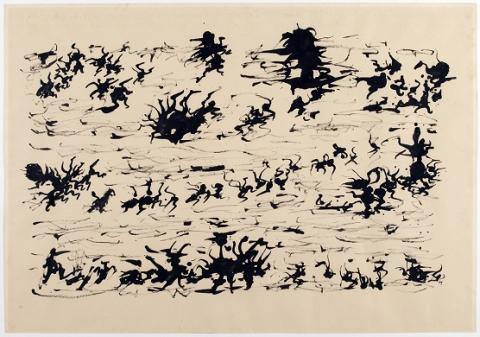
Henri Michaux
1899–1984
_______________________
from Penetralia: “The Dream’s Navel”
Clayton Eshleman
presented by Jerome Rothenberg
(....)
The dream navel is also a knot, tying off mother absence. The cut allowed the child to emerge. What is the Cro-Magnon dream navel? The discovery of the cave wall as a subjectile, the maternal interior having been replaced by the cave. The point of departure for a meander is the dream navel, that nodal knot from which metaphors blossom in every direction.
Some Upper Paleolithic engravings are of “creatures” only vaguely resembling anything that lived: animal-snouted archai on the leash of,
in the harness of,
alchemical mush,
like sled dogs bounding in slow motion
along Combarelle’s Inner Gallery,
heads dissolving into fable drift…
“In fact,” Gaston Bachelard writes, “a need to animalize is at the origins of the imagination… its first function is to create animal forms.”
A wolf spider is staring at me through a Henri Michaux drawing.
“Everything is translation at every level, in every direction.”
It is all about birth, about having
no berth, about being centerless, a core of ore
loss, a log of stammer steps,
screams of lattice ivy, lettuce driven
mind entwines.
So there is no full release
even for the intestines of articulation
as they process the nurture of experience,
phantasy’s wily slip knots, or spit cots,
the bunk of our ardor, where we are
imprisoned in kittens & door slam states.
Michaux: “The person who hasn’t been detested has missed something—common failing among the clergy, pastors, and others of this type, who often make one think of cattle. They lack antibodies.”
We are free only to the degree that we are able to acknowledge our lack of integrity in any moment.
The hidden forever meaning:
we lie in duplex strata, less stalk than tassel scatter.
...(more)
_______________________
The Jetty
Henri Michaux
(Translated by Richard Ellmann)
During the month that I was living at Honfleur I had not yet seen the sea, for the doctor made me stay in my room.
But last night, tired of being so isolated, I built, taking advantage of the fog, a jetty as far as the sea. Then, right at the end of it, letting my legs hang down, I looked at the sea, below me , which was breathing deeply.
A murmur came from my right. It was a man sitting like me with legs swinging and looking at the sea. "Now that I am old" he said "I am going to pull up everything I have put there during the years." He began to draw things up by means of pulleys.
And he brought up riches in abundance. He brought up captains from other ages in dress uniforms, chests studded with all sorts of precious things, and women dressed lavishly but as they no longer dress. And as he brought each being or thing to the surface, he looked at it carefully with high hopes, then without saying a word, while his face fell, he pushed it behind him. So we filled up the entire pier. I don't remember exactly what there was, for I have no memory, but obviously it was not satisfactory, in everything something had been lost which he hoped to recover and which had faded away.
Then he began to throw everything back into the sea.
Like a long ribbon it fell and, when it wet you, froze you.
A last piece of junk which he was pushing off dragged him in too.
As for me, shivering with fever, I wonder how I was ever able to get back to my bed.
quoted in Simplicity: The Prose Poems of Henri Michaux by P. G. R. Nair
_______________________

Alphabet & Writing Copybook
bibliodyssey
'The Writing Pen: a new book containing several alphabets and various moral judgements as well as descriptive formulae, bills of exchange, maritime policies, waybills, and other trade writings in the current style, with a final table of Roman numerals' is an approximate title translation for this slender 18th century Italian volume for improving handwriting skills.
_______________________
My Dementia
Telling who I am before I forget.
Gerda Saunders
For my 61st birthday, in 2010, I was given the diagnosis of microvascular disease, after Alzheimer’s the second leading cause of dementia. I was—as my rather blunt neurologist put it—already “dementing.” Insofar as I had thought about dementia until then, I was unaware that the word had a verb form: he/she/it dements, they dement, we all dement. Yet, no matter my incredulity that this absurd verb could apply to me, now, two years later, “the cloake sitteth no lesse fit” on my chastened back.
My initial denial will seem disingenuous in light of the fact that I knew the symptoms of dementia even then—and recognized them in myself. Also, my mother had a form of mental disconnect that made her increasingly out of touch with reality until her death at 82. Given that, together with the generally known fact that dementia can run in families, why did my doctor’s utterance fall so disconsonantly on my ear?
...(more)
_______________________

The Prey
Hans Hofmann
1956
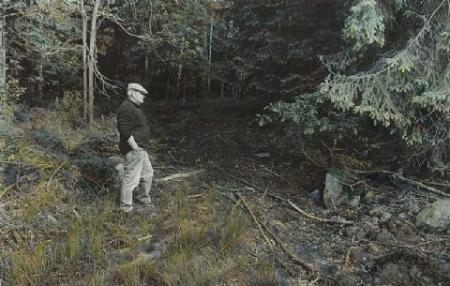
The Studio
Me, Marcus and Bruno
Björn Larsson
.....................................................
Björn Larsson interview
by Rachel Reese
bomb
(....)
RR Do you think the camera is primarily a truth-telling device? Is there a way to utilize the objective nature of the medium, specifically while working within an ideology or predetermined set of conditions, to propose a fiction or non-reality?
BL Well, it’s a tool for realism. And what was regarded as truth yesterday might be a lie today, and vice versa. The camera is definitely a tool for knowledge and study. To say cameras are true is as strange as saying they are false. However, I think that the world of nature photography has not yet been scrutinized in the same way as other, more controversial, fields of photography. I don’t know why. My theory is that most people think of nature as innocent. And talking about this innocence is also innocent. As you can imagine, I disagree. I think talking about nature is very fundamental to all aspects of life, existence, and politics. What is natural is a very hot potato. Looking at beautiful images of wildlife, flowers, and ants—what can be wrong with this?
(....)
BL I wanted to make a portrait of this place or site. The site is a burned down national park and all that it implies about representation of nation and conservatism. To think of a forest in terms of a museum, to preserve it for the future, is an exciting contradiction. When the forest disappeared and the rescue operation caught the whole nation’s interest with large media coverage, I knew it was interesting. This was in the summer of 1999. In my portrait, I followed two lines: one was a photographic documentation of continuous walks in the park over ten years using the same equipment, and the other, collecting documents from institutions, organizations, and the media—those somehow involved in the fire. Together they form two different narratives about the place, one dramatic and the other slow. Since I was not present at the actual event—the fire, police investigation, rescue, media, and aftermath—I want to recall a historic event where nature was not the perpetrator, but the victim. I wanted to mirror Sweden through this event, a country willing to mobilize everything to save a forest.
...(more)
_______________________
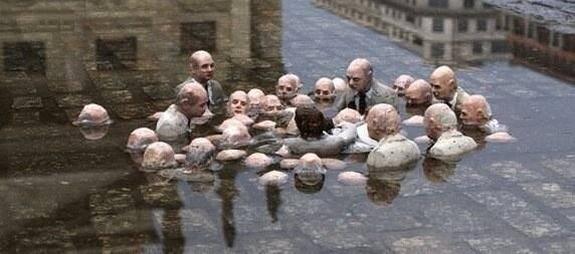
Politicians discussing global warming
Sculpture: Issac Cordal
via Forgottenness
_______________________
Climate Dark Age
SUMMARY: Dr. Michael Jennings says Earth's climate is already beyond the worst scenarios. Could a new Dark Age save us? Dr. Sing C. Chew says we are due. It's edutainment for troubled times.
Radio Ecoshock
(....)
After the interview, Dr. Jennings wrote me an email saying:
"One of the really difficult things is that we can't say exactly how, when, and what will happen. It's a bit like breaking the news to someone that they have cancer and we don't really know whether you are going to live or die. And if you live, what sort of life you will have. Or if you die, what sort of death it will be. One huge difference is that with cancers we have doctors and scientists who work with it and study it and we have case studies. We have no previous experience with climate disruption, no indicators providing hints as to what might happen next.
But like a cancer that someone has not been able to come to terms with, climate disruption now has a stranglehold on the most basic systems by which our planet operates."
He added:
"It will not manifest at the same rate, intensity, or magnitude everywhere. Generally, it's safe to say that temperature extremes will be greater at higher latitudes, storm activity will be greater at lower latitudes. Dry places will get dryer and wet places will get wetter. But the key thing is that in a global economy the disruption of agriculture in one place is likely to destabilize economies and social order in other places that are far away, to say nothing about the potential risk of greater armed conflict."
...(more)
via Synthetic_zero
"Dangerous Climate Change": [pdf]
Required Reduction of Carbon Emissions
to Protect Young People, Future Generations and Nature
James Hansen, Pushker Kharecha, Makiko Sato, Valerie Masson-Delmotte, Frank Ackerman, David J. Beerling,
Paul J. Hearty, Ove Hoegh-Guldberg, Shi-Ling Hsu, Camille Parmesan, Johan Rockstrom, Eelco J. Rohling, Jeffrey
Sachs, Pete Smith, Konrad Steffen, Lise Van Susteren, Karina von Schuckmann, James C. Zachos
_______________________
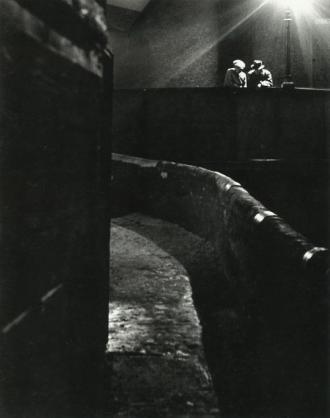
Limehouse
circa 1937
Bill Brandt
1 2 3
via (OvO)
where the celebration of bridges continues
_______________________
The Dark Threw Patches Down Upon Me Also
Ben Lerner
Lana Turner
It was not my intention to travel in time,
watch him distribute dried fruit and sweet
crackers to soldiers in hospital, small sums,
writing their letters, this was back when
you might take it to a cousin to be read
under a cut glass lamp. Why do articles fall out
over time, or get put back in, is that a good
question for the poet if I meet him abroad, aboard
one of several no longer extant ferries?
I am an alien here with a residency, light
alien to me, true hawks starting from the trees
at my footfall on gravel, sun-burnt from reading
Specimen Days on the small porch across
the street from where another poet died
or began dying. ......(more)
_______________________
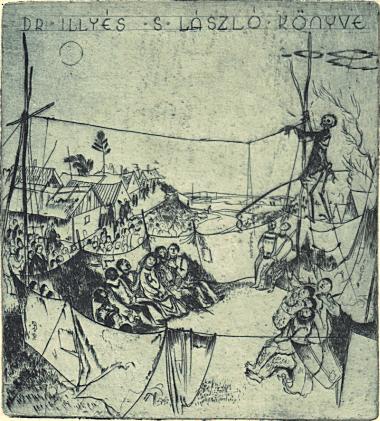
Endre Vadász
Ex Libris Mr. Reaper (12)
Bookplates from the collection of Richard Sica
50watts
_______________________
"How to recognize a work of art? How to separate it, even if just for a moment, from its critical apparatus, its exegetes, its tireless plagiarizers, its belittlers, its final lonely fate? Easy. Let it be translated. Let its translator be far from brilliant. Rip pages from it at random. Leave it lying in an attic. If after all of this a kid comes along and reads it, and after reading makes it his own, and is faithful to it (or unfaithful, whichever) and reinterprets it and accompanies it on its voyage to the edge, and both are enriched and the kid adds an ounce of value to its original value, then we have something before us, a machine or a book, capable of speaking to all human beings; not a plowed field but a mountain, not the image of a dark forest but the dark forest, not a flock of birds but the Nightingale." — Roberto Bolaño — from “Translation Is an Anvil” in Between Parentheses
reposted from We Await Silent Tristero's Empire
_______________________

Bateaux à quai
1939
Endre Vadász
1901 - 1944
_______________________
Nailing Down the Hard Parts
Zachariah Wells
lemon hound
Canadian poetry loves a good debutante ball. Since the 1930s, we have heralded the arrival of new generations of poets in anthologies which are the textual equivalent of coming out parties: momentous to the participants and their families, but of very little long-term interest to serious readers (and only erratically predictive of future success in the field). Like the bad hairdos immortalized in grad-class pictures, they more often than not cause embarrassment later in life.
(....)
We like to pretend that poetry is not a competitive sport, that rivalry somehow cheapens the transcendent, ineffable beauties of the art. But the facts are that poets are many, readers are few and work of lasting merit is very rare. The competition, like it or not, is fierce. Each of the books listed above stakes a pre-emptive claim on posterity; each says in its own way, be it subtle or bold: “Of all the poets and all the books, you’ll be reading me twenty years hence.” Their best poems are not merely solidly crafted, but authentic emanations of individual style. Each poet raises the bar for their peers—and for their own future works. Even so, most, if not all, will be forgotten; predicting what will last is a fool’s errand, as any perusal of old anthologies makes depressingly obvious.
Two recent debut collections with a fighting chance are Pino Coluccio’s First Comes Love and Suzanne Buffam’s Past Imperfect. Neither book much resembles the other, nor do they sound like their peers; both provide pictures of a young poet hacking out their own path through the bush. And in both we see the flowering of an individual style, as well as the blight of strong influence and stylistic habit.
...(more)

photo - mw
_______________________
Robinson Jeffers: The Poet Of Inhumanism
Craig Hickman
noir realism
I am not dead,
I have only become inhuman:
That is to say,
Undressed myself of laughable prides and infirmities…
- Robinson Jeffers, The Selected Poetry Of Robinson Jeffers
Jeffers coined the phrase inhumanism, the belief that mankind is too self-centered and too indifferent to the “astonishing beauty of things.” Jeffers articulated that inhumanism symbolized humans’ inability to “uncenter” themselves. In “The Double Axe,” Jeffers explicitly described inhumanism as “a shifting of emphasis and significance from man to notman; the rejection of human solipsism and recognition of the magnificence of the natural beyond all that is human… This manner of thought and feeling is neither misanthropic nor pessimist…” Robinson Jeffers fashioned the moral and ecological philosophy he termed “Inhumanism” from the natural cycles of “bright power, dark peace; / Fierce consciousness joined with final / Disinterestedness” (“Rock and Hawk” CP 2: 416) which he witnessed from the stone cottage and tower he inhabited on the Carmel coast of Monterey County, California, from 1919 until his death in 1962. In the original version of his “Preface” to The Double Axe and Other Poems (1948), Jeffers described Inhumanism as “a recognition of the astonishing beauty of things and their living wholeness . . . a rational acceptance of the fact that mankind is neither central nor important in the universe; our vices and blazing crimes are as insignificant as our happiness” (CP 4: 418).
“Humanity is the start of the race;
I say Humanity is the mould to break away from,
the crust to break through, the coal to break into fire,
The atom to be split.”
- Robinson Jeffers, Roan Stallion
...(more)
_______________________

Jags
1973
Michael Rothenstein
b. March 19, 1908
_______________________
Good For Nothing
Mark Fisher
the occupied times
(....)
I offer up my own experiences of mental distress not because I think there’s anything special or unique about them, but in support of the claim that many forms of depression are best understood – and best combatted – through frames that are impersonal and political rather than individual and ‘psychological’.
Writing about one’s own depression is difficult. Depression is partly constituted by a sneering ‘inner’ voice which accuses you of self-indulgence – you aren’t depressed, you’re just feeling sorry for yourself, pull yourself together – and this voice is liable to be triggered by going public about the condition. Of course, this voice isn’t an ‘inner’ voice at all – it is the internalised expression of actual social forces, some of which have a vested interest in denying any connection between depression and politics.
...(more)
_______________________
Spent? Capitalism’s growing problem with anxiety
JD Taylor
roar
(....)
Mental health and homelessness charities are being overwhelmed by appeals from millions abandoned for the sake of economic recovery. Study the news for long enough and stories of self-immolation, suicide and death by overworking are by no means unique to the UK (in Japan they term the latter karoshi, whereas in the case of Moritz Erhardt, our coroners call it an entirely unrelated epileptic seizure). But what is innovative is the effective management of the reality presented to entirely remove any collective, public or social basis for these growing problems. Instead responsibility is attributed to the individual, who has either been unfortunate or ineffective at adapting to the world around them.
What I highlight are extreme situations, and my interest is more in the millions who continue to live in more disempowered and restricted circumstances. Behind such cases is a new normal of zero-hour contracts, working without payment (either internships at the top or ‘workfare’ at the bottom) and in states of stress and anxiety, as an increasing dependence on management thrives on sucking the remaining residues of performance from precarious workers. Living costs have sharply risen in rents and goods, while supermarkets, energy firms, landlords and financial traders have greedily increased their profits. For institutions of popular power, scandals like the undemocratic catastrophe of the Afghanistan and Iraq Wars, the exposure of GCHQ and NSA’s total surveillance of internet and telecommunications, mass fraud by MPs of expenses, the rises in university tuition fees and the removal of EMA, regular press phone-hacking, the exposure of Murdoch’s power over successive governments’ policy, routine police racism, unlawful spying of protest groups, or the unprosecuted murders of members of the public, and — as we have already forgotten — the failure to meaningfully punish anyone in the City for the bank collapses of 2008 should have, each, led to a crisis of political legitimacy in the UK. These fine props of the illusion of freedom and prosperity are weakened, yet remain for now stuck in place. The expense of such illusions is a grinding and unnecessary burden, felt by many occasionally and some increasingly often, a burden that for now is explained as the individual’s to carry.
...(more)
via I Cite
_______________________
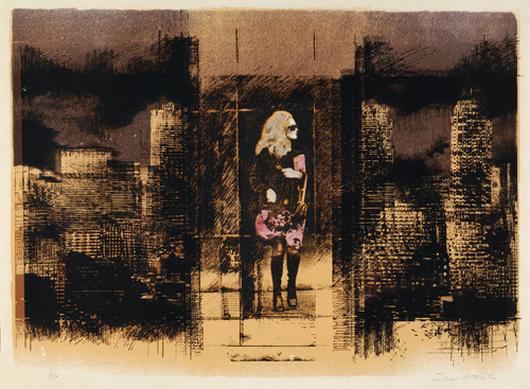
Night City
Michael Rothenstein
1977
_______________________
Finding New Ways to Hide in Plain Sight
Navneet Alang
hazlitt
The body is a text. To communicate with another human being is to consider them as a book. Unable to see into their souls, we encounter others as collections of signs: a smirk or a crinkle around the eyes, a hand placed on a cheek—words upon words as we try, in futility, to express to one another what we think and feel. The soul may be irreducible, but to be human is to reduce it nonetheless.
How, then, should we feel now that the text of the body has become machine-readable?
To be machine-readable is to have bodily signs always on the verge of becoming data, that looming term that seems to at once connote both depersonalization and subsumption into the seething mass of the computerized mind. The amalgam of symbols and signs that comprise the self—everything from our clothes to our communication to our skin—can now be interpreted and understood by a dizzying array of algorithms and cameras. Whether the camera that knows if you’re smiling, or Google’s gentle reminders that it is following your every move, to be alive in the 21st century is to be under surveillance.
Still, a response is afoot. ...(more)
_______________________
Nietzsche and the Burbs
New blog for a new novel.
Lars Iyer
(....)
The suburbs are everywhere. Every point in the suburb is the centre of the world. Because there is no centre. Here is everywhere. Here is nowhere.
The suburbs: the world. The hollowing out of the world.
The suburbs are the denouement. A very long denouement. An eternal denouement.
The searching sky, looking for me, but blindly, blindly. Like a blind God. Like God Himself, gone blind and mad.
(....)
_______________________
The Fire Sermon
Joshua Clover
(....)
2. Transistor
for Ruth Jennison
There will be a revolution or there will not. If the latter these poems were nothing
but entertainments. If the former it will succeed or fail. If the latter these poems
were better than nothing. If the former it will feature riots fire and looting and these
will spread or they will not. If the latter these poems were curiosities. If the former it
will feature further riots manifestos barricades and slogans and these will leap into
popular songs or they will not. If the latter that’s that. If the former these popular
songs will be overcome or they will not. If the latter these poems were no different
than the songs. If the former the popular itself will be abolished via riots barricades
manifestos occupations and fire or it will not. If the latter we will spend several
more decades talking about culture. If the former the revolution will at this point be
destroyed from within or without. If the latter these poems went down fighting. If
the former it will feature awful confrontations with former friends and there will be
further manifestoes new slogans ongoing occupations and communes and lovers
will be enemies. We do not know what will happen after this point but surely this is
enough to draw some preliminary conclusions. The poem must be on the side of
riots looting barricades occupations manifestos communes slogans fire and enemies.
...(more)
Lana Turner
_______________________

Michael Rothenstein

Boy with kindling
Krochmalna Street, Warsaw
ca. 1935-38
Roman Vishniac
1897 - 1990
1 2
_______________________
from Antonio Porchia's Voices
spurious
Truth has very few friends and those few are suicides.
Man goes nowhere. Everything comes to man, like tomorrow.
A door opens to me. I go in and am faced with a hundred closed doors.
My poverty is not complete: it lacks me.
In no one did I find who I should be like. And I stayed like that: like no one.
(....)
He who tells the truth says almost nothing.
Only the wound speaks its own word.
...(more)
_______________________
Poems
Ene Mihkelson
Translated by Jüri Talvet and H.L. Hix
Yes still this sense that those rare
soulbirds who really hear and know
touch as well as flight
must be sheltered from night’s harshness
All souls suffer a body Sadness limits
them no less than the soulless who
always distinguish cause from ef-
fect They preach fundamentals
the four compass points while from the birdsouls
feather after feather falls in flight
until finally the air cannot carry them
(the Juhan Liiv poetry award 1999)
The soul sometimes gasps in the breast
It does not want to fly to the air in these
explosive times It grips the ribs like bars
But then it comes murmuring Houses tremble
in fear Because everything happens inside
not outside
...(more)
with thanks to flowerville
_______________________
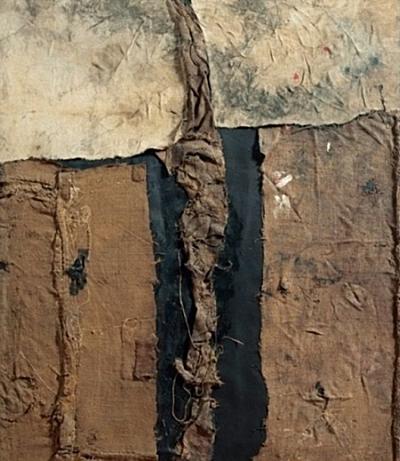
Alberto Burri
1953
_______________________
“We Need Cruel Comedy” —A Lars Iyer Interview
By Edwin Turner
Biblioklept
(....)
Biblioklept: I want to talk about the end of Exodus but that seems like bad form for an interview. Spoilers, etc. Can you comment on where you leave your protagonists, or how you leave them, or why you leave them?
LI: I leave my protagonists roughly where they were at the beginning of the trilogy: rudderless, rather lost, full of a sense of their failure, but with their friendship, such as it is, intact. ‘No hugs, no lessons’: my characters haven’t learned anything…
Biblioklept: Why can’t they learn? Why the repetition? Why not a heroic arc? Why not a saving grace?
LI: Perhaps because learning implies a kind of resolution that I think is inappropriate for the characters. Kundera says something apposite about Don Quixote. Cervantes makes his would-be knight-errant set off in search of battles, ready to sacrifice his life for a noble cause, ‘but tragedy doesn’t want him’. Kundera goes on:
since its birth, the novel is suspicious of tragedy: of its cult of grandeur; of its theatrical origins; of its blindness to the prose of life. Poor Alonzo Quijada. In the vicinity of his mournful countenance, everything turns into comedy.
So it is with my trilogy. No tragedy! No heroism! No tragic catharsis, that would see the tragic hero being dragged back into line. And no comic catharsis either, in which the older norms of a traditional societal system are reaffirmed. So much comedy is self-congratulatory, self-reassuring: the humour of good cheer, of port and cigars. It shores up things as they are. This is why I can never bear to watch comedy on television. It’s so rare to see comedians turn the joke on themselves. We need cruel comedy. Black comedy, which laughs at itself laughing…
Why the use of repetition in my novels? Because I want to portray the breakdown of things as they are, not once, but again and again. Failure, without amelioration. Serio-comic breakdown, without restitution. Anomie. Helplessness. Crushed hope. How else to acknowledge the prose of our lives?
Much of the humour of Don Quixote, depends on the contrast between lofty ideals and the concrete, everyday, corporeal life. The humour of my trilogy is analogous – but, of course, our everyday is utterly changed! A generalised precarity, un- and under-employment, free-floating anxiety, consumerism, the emphasis on self-representation, the sense that history is over, that politics is all played out, that financial and climatic catastrophe loom…
The tragedy of everyday life is that it’s not even tragic. It never reaches the lofty heights of tragic grandeur. Well, nor do my characters. When W. is at his most wretched, he cannot even die – that’s the end of Dogma. When W. is at his most revolutionary, participating in his own version of the Occupy movement, as at the end of Exodus … well, I won’t spoil the story, but it won’t surprise readers of previous books in the trilogy that there is neither a heroic arc nor a saving grace.
...(more)
_______________________

Consciousness of Shock
Victor Brauner
1951
_______________________
The Labor of the Inhuman, Part I: Human
Reza Negarestani
e-flux
Inhumanism is the extended practical elaboration of humanism; it is born out of a diligent commitment to the project of enlightened humanism. As a universal wave that erases the self-portrait of man drawn in sand, inhumanism is a vector of revision. It relentlessly revises what it means to be human by removing its supposed evident characteristics and preserving certain invariances. At the same time, inhumanism registers itself as a demand for construction, to define what it means to be human by treating human as a constructible hypothesis, a space of navigation and intervention.
Inhumanism stands in concrete opposition to any paradigm that seeks to degrade humanity either in the face of its finitude or against the backdrop of the great outdoors. Its labor partly consists in decanting the significance of human from any predetermined meaning or particular import set by theology—thereby extricating human significance from human veneration fabricated as a result of assigning significance to varieties of theological jurisdiction (God, ineffable genercity, foundationalist axiom, and so forth).
Once the conflated and the honorific meaning of man is replaced by a minimalist yet functionally consequential, real content, the humilific credo of antihumanism that subsists on a theologically anchored conflation between significance and veneration also loses its deflationary momentum. Incapable of salvaging its pertinence without resorting to a concept of crisis occasioned by theology, and unsuccessful in extracting human significance by disentangling the pathological conflation between real import and glorification, antihumanism is revealed to be in the same theological boat that it is so determined to set on fire.
Failing to single out significance according to the physics that posits it rather than the metaphysics that inflates it, antihumanism’s only solution for overcoming the purported crisis of meaning comes by adopting the cultural heterogeneity of false alternatives (the ever increasing options of post-, communitarian retreats as so-called alternatives to totality, and so forth). Rooted in an originary conflation that was never resolved, such alternatives perpetually swing between their inflationary and deflationary, enchanting and disenchanting bipolar extremes, creating a fog of liberty that suffocates any universalist ambition and hinders the methodological collaboration required to define and achieve a common task for breaking out of the current planetary morass.
In short, the net surfeit of false alternatives supplied under the rubric of liberal freedom causes a terminal deficit of real alternatives, establishing for thought and action the axiom that there is indeed no alternative. The contention of this essay is that universality and collectivism cannot be thought, let alone attained, through consensus or dissensus between cultural tropes, but only by intercepting and rooting out what gives rise to the economy of false choices and by activating and fully elaborating what real human significance consists of. For it is, as will be argued, the truth of human significance—not in the sense of an original meaning or a birthright, but in the sense of a labor that consists of the extended elaboration of what it means to be human through a series of upgradable special performances—that is rigorously inhuman.
...(more)
via —synthetic_zero
_______________________

Moonlight
1903
Arthur Becher
1877-1941
The Art of the Photogravure
_______________________
Redemptive Revolutions: The Political Hermeneutics of Walter Benjamin [pdf]
Nicolai Krejberg Knudsen
Abstract
This paper develops a political hermeneutics through the thought of Walter Benjamin by asking how it is possible to identify an emancipatory and revolutionary potential, when capitalist catastrophe is omnipresent and the historiographical notions of progress and continuity are rejected. I explain Benjamin’s late concept of the weak Messianic force, partly, as a political theology and, partly, as a critique of ideology. In order to reveal the actual political potency of Benjamin’s thought, this emancipatory potential must be connected with a collective subject capable of revolutionary action. I establish this connection through a dialectical reading of Benjamin’s early materialism and his later philosophy of history mediated by ‘The Critique of Violence.’ Only by articulating this overarching political framework of Benjamin’s thought, can a hermeneutically useful concept of revolution be developed, which will explain why revolution is necessarily linked to both divine and mythical violence.
Crisis and CritiqueVolume 1, Issue 1, 2014 Democracy and Revolution
Edited by Henrik Jøker Bjerre & Agon Hamza
|




































